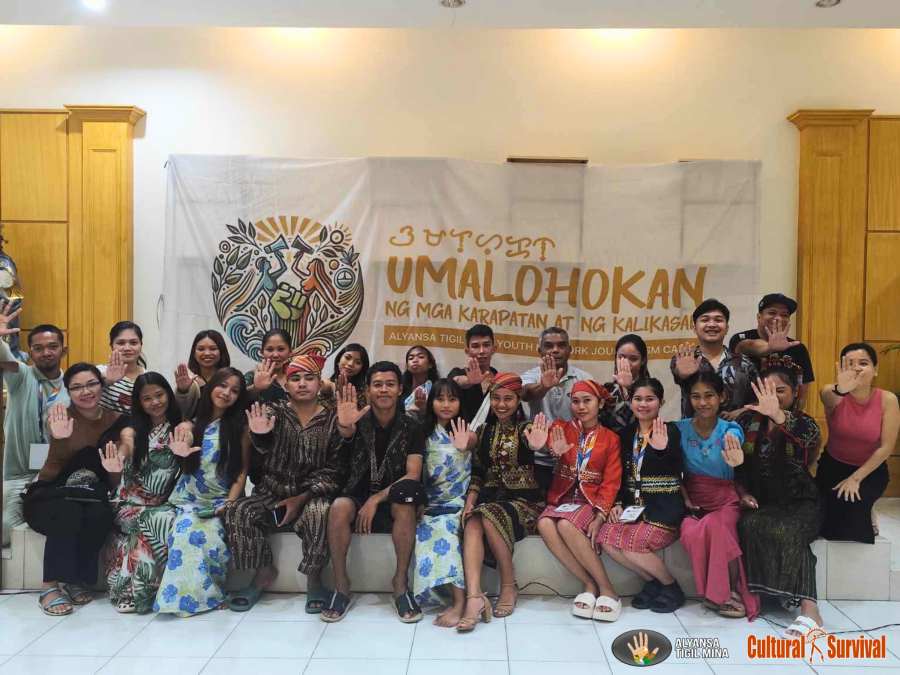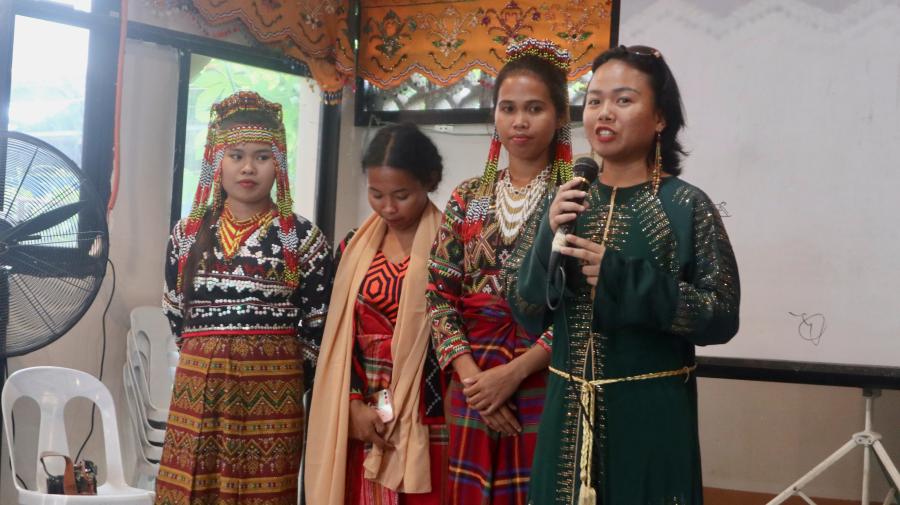She is up and at the water faucet before most in her area of the village. With only four faucets to serve at least 650 people, the sooner one reaches the faucet, the sooner one can wash one's dishes, clothes and self. After tending to herself, she hoists the filled plastic container to her shoulder and walks home. These may be the only moments she has to herself that day. After boiling water for a morning drink of coffee or ginger tea, she joins other members of the family in the fields planting, weeding, harvesting corn, rice and vegetables, and cooking the midday meal. It is her duty as a T'Boli woman to do such things and, if she has a child (five children is the average), attendance to the child adds to her list of responsibilities. Arriving back at the village, she undertakes the chores which close the day. Having collected vegetables from the area and pounded the rice, she cooks the last meal, cleans the home, and prepares for the next day's routine.
This is the day-to-day life of the traditional T'Boli woman: a life determined by duties to family, community and husband. Age determines the effort expended upon these activities. An older woman has more authority over younger members of her extended family, whether they are male or female; she is able to visit with friends and neighbors between her responsibilities. Although, ideally, the woman's role complements the agricultural duties of the man, most T'Boli women consider their role "tey megal" or very difficult. However, according to most T'Boli men and women, the roles of both sexes are made still more difficult by the transitions forced upon them by modernization.
The T'Boli are one of the 87 tribal groups in the Philippines which make up 15 percent of the population. They number approximately 60,000 and reside inland from the southern coast of Mindanao. Until the present generation, the T'Boli were hunter/gatherers and agriculturalists, using slash and burn techniques to farm both the upland mountainous regions and the flat lowland areas. Twenty-five years ago written T'Boli did not exist, polygamy was more actively practiced, and barter was the principal form of economic exchange - it has since been replaced by a money economy. Like their Muslim neighbors, the majority of T'Boli women were, as the opening profile suggests, mute attendants to their families, husbands and farms.
In the last thirty years, the migration of mainstream northern Filipinos to the southern regions of Mindanao has caused a shift in social roles and values. The "lo-landers," as the colonists are commonly called, brought not just land rights but also different cultural and family norms. Superior knowledge of the market economy enabled many of the northern migrants to establish themselves in positions of economic and political power. Many of the T'Boli were forced from their land in the lowland areas and into upland regions, limiting their agricultural production and economic security. Markets for cash exchange were established. Buying and selling stations and drying and shelling operations for rice and corn production were created. Although some bartering still exists among the T'Boli, the influence of a market system inevitably wove itself into the fabric of T'Boli life.
Even to the casual observer, the disruptions of the traditional roles assigned to family and the sexes' work are evident. Generational and financial differences are marked. The young people favor blue jeans over the traditional lemwek, or long skirt, worn by the elders. Those who can afford to attend school, those who can't don't and are pushed closer to the margins of the emerging society.
The T'Boli community of Lemsnolon, where I lived and worked, straddles tenuously the forces imposed by "the lo-landers," governmental attempts to control and market colorful tribal customs and artifacts, and their own security needs in the midst of such contradictory influences.
The dynamics of modernization are also at work changing the lives of T'Boli women. Caught between tradition and modernization, they have adapted in a variety of ways.
Ye Igi is the mother of five, a farmer and tribal dancer, entertaining such dignitaries as President Marcos both in his palace at Malacangang and in Lemsnolon. She is also an artisan and entrepreneur, who makes and sells her necklaces of molten plastic to tourists and friends.
She shapes the plastic into a small bead around the thin metal rod with a knife inherited from her mother years ago. With painstaking concentration she winds a thinner reed of plastic thread around the bead and places it in the face of a heated log, then repeats the process. For the experienced artisan it takes approximately half an hour to make each bead and one week to complete the entire necklace. Ye Igi has been able to make a necklace in three days and then sell or barter it just as quickly.
She must work quickly. Aside from thrice-yearly sales of corn and rice, she and her family have no other source of income with which to put the remaining two sons through school. Once a privilege, schooling has fast become a requirement for survival since limited access to the land has curtailed farming as an occupation for the young people of Lemsnolon. Without the credentials that come from a formal education, and without land, the contemporary T'Boli have little chance of supporting themselves and extended family members to whom they are obligated.
Consequently, the roles of men and women have shifted. Although both sexes hold responsible positions in the maintenance of the home, family and work, women now take a more active role in producing and selling their own products; whether it be in the form of cash crops, labor, or in Ye Igi's case, handicrafts.
Aning, at eighteen years of age, is equipped to cope with life using less defined skills. The number of T'Boli high school students has increased slightly. Even so, Aning would have been one of the fortunate few if she had graduated and pursued her interest in teaching. Her tuition was provided for her by her brother, the datu or tribal leader. However, plans for graduation were replaced by a forced marriage when it was learned that she was pregnant. This fact was bitterly revealed to me as I assisted at the birth of her child.
Aning lay in the corner of the room; the child lay on the floor between her legs. The elderly midwife was still in the process of trying to pull the placenta from Aning's unrelenting womb. Fans fluttered, carrying the prayers spoken by relatives lamenting the potential loss of the child. Necklaces, valued for their craftsmanship and age, hung on the walls and covered the belly of Aning as forms of retribution for past grievances or differences unsettled. Whether male or female, a child is usually cherished. However, in Aning's case, life or death of the child meant life or death for a marriage about which she was ambivalent. "I have no choice," she explained. "I have to follow what they [the elders] say. I am dependent on them..."
Like most adolescents in Lemsnolon, Aning spent much of her life in the lowlands aspiring to the goals of mainstream Filipino culture. She has never acquired the traditional skills of the upland T'Boli women who do not come into contact with the "lo-landers." Aning has been prevented from pursuing the further development of her interests and has been thrust into a role she was not prepared to accept. Custom dictates that Aning's husband must farm and that Aning assist on the farm and tend to the children. Without land or a degree, her husband hires himself out as a laborer while Aning remains at home tending her child. For her or her husband to resume school and the pursuit of school-related goals would require a balancing act between the rules of both cultures.
Silin is 23 years old and, like Aning, attended lowland school. She embraces a different perception of herself and her position in life. Having acquired a variety of skills when she lived and worked for several years with the Summer Institute of Linguistics, she now serves as a teacher and liaison for the community at large. If a translator is needed, she is there to interpret, using one of the five languages she knows well. If a medical emergency arises, she is the one to be consulted. Yet, her eclectic, comparatively unusual, and rich background leaves her feeling estranged from the community and the people to whom she chose to return. After suggesting to the midwife attending to the birth of Aning's child that the umbilical cord be cut and the child nursed immediately, Silin explained, "I just wait for them [the elders] to die off so that we [the younger generation] can take over. They do not listen. They are stubborn about holding onto their traditional beliefs!"
Silin was the only T'Boli woman in Lemsnolon to refuse to include a dowry in her marriage contract. She is one of a few to let it be known publicly that she will not be a member of a polygamous marriage. And she is the only one in the village who encourages other women to follow her example. Silin recognizes the value of her cultural heritage, or she would not have returned, but she rejects many of its tenets, replacing them with alternatives derived from other influences in her life. Among those her age and younger she serves as a role model, but to the elders she is an anomaly, a woman with mayuk nawa, or different breath, with strange ideas. Silin feels keenly the conflicting perceptions of her role as a woman. She described her feelings the day Aning's child was born. "I feel like I am surrounded...That I am alone, even though I chose to come back to my people to help in any way I can..."
Although Silin's particular history enabled her to develop a broader vision than most of her contemporaries, she still feels inadequate in the face of the current requirements of socialization. "I am worried that I will not be able to keep up with Lubu (her son)...I stopped helping him learn to count because he learns too quickly. I am afraid I will have nothing to offer to him after a while..."
By assuming that the history, songs, dance, crafts and cultural values of the T'Boli are not enough to teach her child, Silin implicitly criticizes herself as well as her culture as viable agents for the transmission of useful knowledge. If the effects of modernization leave such a residue of self-doubt, cultural confusion and animosity toward one's heritage, its virtues seem superfluous.
So where does the T'Boli tribal woman stand in the 1980s? Ye Igi embraces her culture and productively combines its attributes with methods acceptable to the surrounding cultures. She represents those who actively conserve aspects of their culture, helping to create and maintain the distinctive characteristics of T'Boli culture. She is at once a figurehead for what was and a model for how to cope with what is, at a time when both the past and the present conflict.
Aning is suspended from further developing skills acquired from a different culture, yet she has little facility in the traditional skills upon which she must now depend. Silin, on the other hand, is frustrated rather than liberated. Quietly seething instead of rejoicing at her skills and accomplishments, she remains what she should be according to custom rather than what she wants to be.
Ideally, modernization increases opportunities for mobility, participation in economic activities, and participation in the political decision-making processes. Although some T'Boli women have taken advantage of this potential, the residual effects of modernization lead one to question. Is there room for the comfortable compromise Ye Igi has created, or, as Silin contends, must the older generation "die off" before the younger T'Boli "take over?" What will happen to the tribal women who, like Aning, are caught in a conflict of cultural loyalties? The tribal T'Boli woman of the 1980s lives in a tenuous world of continual adjustment and accommodation. Her challenge is to find a niche which comfortably accommodates both.
Article copyright Cultural Survival, Inc.



